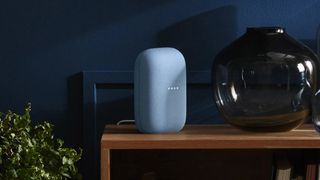It’s now easier than ever to get Google Assistant to stop talking, but is it making us rude?
Opinion: is the way we talk to voice assistants affecting our real-life communication skills?

It’s now even easier to get Google Assistant to stop talking mid-way through a response – you can just say “Stop” without having to utter “Hey Google” first.
The feature, which Google unveiled in a tweet, is available on smart speakers and smart displays that feature Google Assistant built in. Currently, Apple’s voice assistant, Siri, already offers this function and will cut off mid-response if it hears “stop” uttered.
Amazon is lagging behind with this functionality, as it's not something Alexa understands right now. Alexa will continue with its audible responses to a query unless its wake word, which can be Alexa, Amazon, Echo, Computer, or, if you’re in the US, Ziggy, precedes the command to stop.
However, could dispensing with the formalities when talking to our smart assistants encourage bad habits that we carry into our everyday interactions with other people? To put it bluntly, could it make us rude?
Hey Google, put a sock in it
Smart speakers and smart displays have become part of everyday life in the past few years. According to market research firm Statista, 90.7 million Americans own a smart speaker, which equates to around 35% of the population. They can provide information on everything from the weather to recipes, as well as playing your favorite music and letting you control your smart home.
If you’re anything like me, though, there are times when you just want your voice assistant to, well, be quiet. For example, before leaving the house I often ask my smart speaker for the temperature, so I can decide what coat if any, I need to wear. While the voice assistant will respond with the current temperature, it will often then go on to provide information about how hot or cold it will be later in the day. But that’s not something I’m not really bothered about, as if it gets too hot later in the day I can always take my coat off.
Usually, when I’m asking my smart speaker this information, I’m about to rush out the door, so having the option to cut it off mid-sentence makes sense, and the fewer words I need to say to do that, the better. After all, those precious few seconds could mean the difference between catching and missing my train. But, could talking to our smart speakers in this way turn us into a generation that’s, quite frankly, more rude?
I was brought up to mind my p’s and q’s so I always try to say please and thank you whenever I’m asking for anything. However, I’ve found when it comes to dealing with a smart speaker, being polite is something that I’m doing less and less. I may have started out with phrases such as “Please can you give the weather for today” but over time it’s gradually become shortened to simply “What’s the weather?”.
Get daily insight, inspiration and deals in your inbox
Get the hottest deals available in your inbox plus news, reviews, opinion, analysis and more from the TechRadar team.
So if I start shouting “stop” at a voice assistant mid-sentence because it’s offering information I don’t need, how long before that filters into my everyday conversation? Will I suddenly shout “stop” at shop staff trying to sell me products I don’t need rather than simply listening to the patter, before politely declining and walking away?
Will debates become a thing of the past, because one party abruptly terminates the conversation with one word? Unfortunately, I can certainly see instances where this might happen. So I, for one, will be trying not to use this particular smart speaker function unless it’s really necessary, and I’ll make a conscious effort to continue being polite to everyone – including the voice assistant in my home.
Fancy bringing a voice assistant into your home? Then check out the best deals on smart speakers and smart displays available right now.
- Check out these great smart home device deals
Carrie-Ann Skinner was formerly Homes Editor at TechRadar, and has more than two decades of experience in both online and print journalism, with 13 years of that spent covering all-things tech. Carrie specializes in smart home devices such as smart plugs and smart lights, as well as large and small appliances including vacuum cleaners, air fryers, stand mixers, and coffee machines. Carrie is now a copy editor at PWC.

